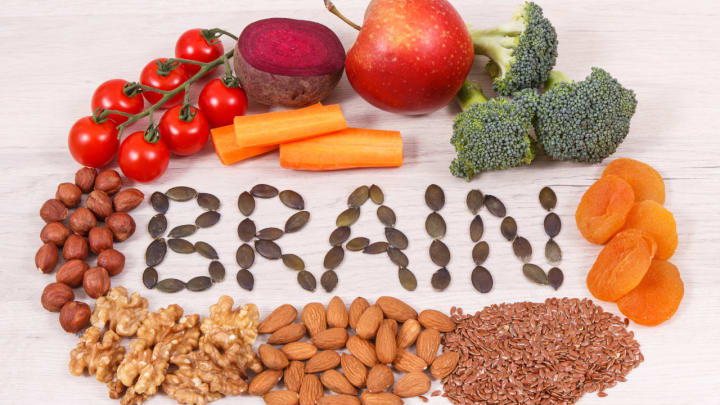The Gut-Brain Connection: How Your Gut Health Affects Your Mental Health
Nourishing Your Gut, Nurturing Your Mind...

Introduction
Have you ever experienced a "gut feeling" or noticed that your stomach gets upset when you're stressed? The connection between our gut and brain is more profound than we might realize. In recent years, research has shed light on the fascinating relationship between gut health and mental health. It turns out that the state of our gut can significantly impact our mental well-being. In this article, we'll explore the intricate connection between the gut and brain and how prioritizing gut health can positively influence our mental health.
Understanding the Gut-Brain Connection
The gut-brain connection refers to the bidirectional communication between the gastrointestinal tract (the gut) and the brain. This communication occurs through a complex network of nerves, hormones, and chemicals. Scientists often refer to this connection as the "gut-brain axis," highlighting the constant interaction between these two vital systems.
The Role of Gut Microbiota
At the heart of the gut-brain connection lies the gut microbiota, a diverse community of microorganisms that reside in our digestive system. These microbes, including bacteria, viruses, and fungi, play a crucial role in maintaining our overall health. They aid in digestion, support the immune system, synthesize vitamins, and even produce neuroactive compounds.
Gut Health and Mental Health
The state of our gut health can significantly influence our mental well-being. Let's dive into the ways in which gut health affects our mental health.
- Gut-Brain Axis: Communication Pathway
The gut and the brain communicate through several pathways, including the vagus nerve, hormonal signaling, and immune system modulation. This bidirectional communication allows for a constant exchange of information and signals between the two systems.
- Influence on Mood and Emotions
Did you know that a considerable portion of the neurotransmitter serotonin, often referred to as the "feel-good" hormone, is produced in the gut? In fact, about 95% of serotonin is synthesized in the gastrointestinal tract. This neurotransmitter plays a vital role in regulating mood, emotions, and overall well-being. An imbalance in gut microbiota can disrupt serotonin production, potentially leading to mood disorders such as anxiety and depression.
- Impact on Cognitive Function
Emerging research suggests that gut health also influences cognitive function. The gut-brain connection plays a role in memory, attention, and decision-making processes. Imbalances in gut microbiota have been linked to cognitive impairments and neurodegenerative diseases such as Alzheimer's and Parkinson's.
Factors Affecting Gut Health
Various factors can impact the health of our gut, ultimately influencing our mental well-being. Let's explore some of these factors:
- Diet and Nutrition
The food we consume plays a vital role in shaping our gut microbiota. A diet high in processed foods, refined sugars, and unhealthy fats can disrupt the balance of gut bacteria, leading to inflammation and a compromised gut barrier. On the other hand, a diet rich in whole foods, fiber, and fermented foods can nourish and support a diverse and healthy gut microbiota.
- Stress and Anxiety
Stress and anxiety can wreak havoc on our gut health. When we're stressed, our body produces stress hormones that can disrupt the balance of gut bacteria and increase gut permeability. This can trigger inflammation and gastrointestinal symptoms. Additionally, the gut microbiota produces neurotransmitters that influence our stress response, further highlighting the intricate relationship between stress, the gut, and mental health.
- Sleep and Exercise
Inadequate sleep and a sedentary lifestyle can also impact gut health. Poor sleep quality and duration can disrupt the delicate balance of gut microbiota, while regular exercise has been shown to promote a diverse and healthy gut microbial community. Prioritizing quality sleep and engaging in regular physical activity can positively influence both gut and mental health.

Improving Gut Health for Better Mental Health
Taking steps to improve gut health can have a profound impact on our mental well-being. Here are some strategies to consider:
- Probiotics and Fermented Foods
Incorporating probiotics and fermented foods into your diet can introduce beneficial bacteria to your gut. Probiotics are live microorganisms that provide health benefits when consumed, while fermented foods like yogurt, sauerkraut, and kimchi naturally contain beneficial bacteria. These can help restore and maintain a healthy gut microbiota.
- High-Fiber Diet
Aim to consume a diet rich in fiber, as it serves as fuel for the beneficial bacteria in your gut. Fruits, vegetables, whole grains, and legumes are excellent sources of dietary fiber. By nourishing your gut microbiota, you support their ability to produce beneficial compounds and promote a healthy gut environment.
- Stress Management Techniques
Managing stress is crucial for maintaining gut health. Engaging in stress-reducing activities such as mindfulness meditation, deep breathing exercises, or engaging in hobbies can help calm the mind and support a healthy gut-brain connection. Finding techniques that work for you can significantly impact your mental well-being.
- Regular Exercise
Physical activity not only benefits your physical health but also positively influences your gut and mental health. Engaging in regular exercise can enhance the diversity and abundance of beneficial gut bacteria. Aim for a mix of aerobic exercises, strength training, and activities you enjoy to reap the mental and gut health benefits.
Seeking Professional Guidance
If you're experiencing persistent gut or mental health issues, it's essential to seek professional guidance. A healthcare provider or a registered dietitian can assess your specific needs and recommend personalized interventions to support your gut and mental health.
Conclusion
The gut-brain connection is a fascinating aspect of human physiology, highlighting the intricate interplay between our gut health and mental well-being. By prioritizing our gut health through a wholesome diet, stress management, and lifestyle practices, we can positively influence our mental health and overall quality of life. Remember, the road to better mental health begins in the gut.
FAQs
1. Can gut health affect my mood?
Absolutely! The gut-brain connection plays a significant role in regulating mood. Imbalances in gut microbiota can impact the production of neurotransmitters, such as serotonin, which influence mood and emotions.
2. Are there specific foods that promote gut health?
Yes, including fiber-rich foods, fermented foods like yogurt and sauerkraut, and foods rich in omega-3 fatty acids. These support healthy gut microbiota.
3. Can stress worsen gut health?
Stress can disrupt the balance of gut bacteria, increase gut permeability, and trigger inflammation. Managing stress is crucial for maintaining gut health.
4. How long does it take to see improvements in gut health?
Improving gut health is a gradual process. With consistent dietary and lifestyle changes, you may start noticing positive changes in a few weeks to a few months.
5. Should I take probiotic supplements?
While probiotic supplements can be beneficial, it's best to consult with a healthcare provider or a registered dietitian to determine if they are suitable for your specific needs. They can provide guidance on the right strains and dosage.
About the Creator
Jimei Perry
I am passionate about health and wellness, dedicated to helping individuals achieve their highest level of well-being. My writing encompasses topics such as nutrition, fitness, mental health, self-care practices, and mindful living.






Comments
There are no comments for this story
Be the first to respond and start the conversation.